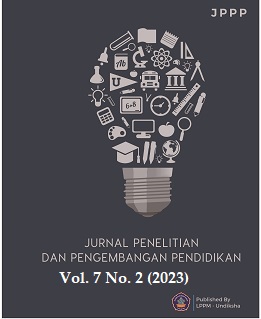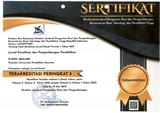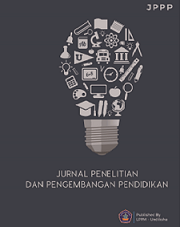Counseling Program Based on Android as Digital Consultation Media
DOI:
https://doi.org/10.23887/jppp.v7i2.53906Keywords:
E-counseling, Guidance, Android, Consultation mediaAbstract
Online tutoring can be provided ethically and have effective results. However, the context surrounding the application of online counselling is debatable, with limited research having been conducted examining the use of online counselling. This study aims to develop an Android-based e-counselling guidance program. This type of research is created using the Alessi and Trollip development model, which consists of 3 stages: planning, design, and development. The research subjects were 29 students and 1 teacher/counsellor. This study's data collection methods use questionnaires, tests and interview guidelines. The data collection instrument uses a questionnaire sheet. Data analysis techniques using qualitative and quantitative descriptive analysis. The research results are that the developed media is validated by media experts and material experts, with the validation results obtained an average score of 3.4 (very valid) and an average score of 3.7 (very valid) by media experts. E-Counselling guidance through field tests meets very practical criteria. The e-counselling guidance program facilitates the consultation process for students and teachers/counsellors, improving student learning outcomes. The study implies that e-counselling can be included in guidance and counselling services by school counsellors.
References
Alwi, N. M., Pandang, A., & Aryani, F. (2019). The development of “problem box e-counseling” Android-based application as a medium for students’ problem disclosure. Jurnal Psikologi Pendidikan Dan Konseling: Jurnal Kajian Psikologi Pendidikan Dan Bimbingan Konseling, 5(2), 112. https://doi.org/10.26858/jppk.v5i2.10180. DOI: https://doi.org/10.26858/jppk.v5i2.10180
Amri, K., Mudjiran, & Karneli, Y. (2020). WEB-Based e-Personal Counseling (e-PC) Model to Reduce Anxiety Dealing Wth National Examination. Proceedings of the 2nd International Conference Innovation in Education (ICoIE 2020), 504(ICoIE), 87–92. https://doi.org/10.2991/assehr.k.201209.198. DOI: https://doi.org/10.2991/assehr.k.201209.198
Bahago, S. B. & J. B. (2022). E-Counselling Accessibility amidst Covid-19 Pandemic among Secondary School Students in Southern Kaduna State, Nigeria. African Scholars Journal of Education Research and Library Practice(JERLP-8), 24(8), 99–120. https://www.africanscholarpublications.com.
Beidoʇlu, M., Dinçyürek, S., & Akintuʇ, Y. (2015). The opinions of school counselors on the use of information and communication technologies in school counseling practices: North Cyprus schools. Computers in Human Behavior, 52, 466–471. https://doi.org/10.1016/j.chb.2015.06.022. DOI: https://doi.org/10.1016/j.chb.2015.06.022
Benedict, B. S., & Michael, F. B. (2022). Availability of E-Counselling Services for Students in Secondary Schools Amidst Covid-19 : A Case Study of Niger State. Afropolitan Journals, 3(2), 41–51. https://publications.afropolitanjournals.com/index.php/ajhcer/article/view/77.
Budianto, A. E., Aziz, A., & Hidayah, N. (2019a). ICT application in cyber counseling as a teacher accelerator with optimizing WhatsApp based mobile computing. Journal of Physics: Conference Series, 1375(1). https://doi.org/10.1088/1742-6596/1375/1/012006.
Budianto, A. E., Aziz, A., & Hidayah, N. (2019b). ICT application in cyber counseling as a teacher accelerator with optimizing WhatsApp based mobile computing. Annual Conference of Science and Technology Journal of Physics: Conference Series. https://doi.org/10.1088/1742-6596/1375/1/012006. DOI: https://doi.org/10.1088/1742-6596/1375/1/012006
Budianto, A. E., Aziz, A., & Hidayah, N. (2019c). The Use of Online Counselling Platform among Youth : The Interrelationship among Attitude , Self- Stigma , and Intentions Explained. 1st International Conference on Advance and Scientific Innovation (ICASI) IOP Publishing IOP Conf. Series: Journal of Physics: Conf. Series. https://doi.org/10.1088/1742-6596/1175/1/012237. DOI: https://doi.org/10.1088/1742-6596/1175/1/012237
Cohen, L., Manion, L., & Morrison, K. (2017). Research Methods in Education. Research Methods in Education, 440–456. https://doi.org/10.4324/9781315456539. DOI: https://doi.org/10.4324/9781315456539-22
Creswell, J. W. (2018). Creswell_Research_Design_ Qualitative, Quantitative, and Mixed Methods Approaches. In Sage Publications Inc.
Day, M. A., Anthony, C. A., Bedard, N. A., Glass, N. A., Clark, C. R., Callaghan, J. J., & Noiseux, N. O. (2018). Increasing Perioperative Communication With Automated Mobile Phone Messaging in Total Joint Arthroplasty. Journal of Arthroplasty, 33(1), 19–24. https://doi.org/10.1016/j.arth.2017.08.046. DOI: https://doi.org/10.1016/j.arth.2017.08.046
Fadkhurosi, A., & Kusmaryani, R. E. (2022). Counseling Based on Andragogy Via WhatsApp to Reduce Students’ Anxiety During COVID-19 Pandemic. Proceedings of the International Seminar on Innovative and Creative Guidance and Counseling Service (ICGCS 2021), 657(Icgcs 2021), 5–12. https://doi.org/10.2991/assehr.k.220405.002. DOI: https://doi.org/10.2991/assehr.k.220405.002
Firdaus, D. R. A., Aryani, F., Pandang, A., & Sinring, A. (2022). Development of a virtual counseling room model to increase student interest in using guidance and counseling services. Jurnal Psikologi Pendidikan Dan Konseling: Jurnal Kajian Psikologi Pendidikan Dan Bimbingan Konseling, 8(1), 23. https://doi.org/10.26858/jppk.v8i1.25587. DOI: https://doi.org/10.26858/jppk.v8i1.25587
Gall, M. D., Gall, J. P., & Borg, W. R. (2007). Educational Research: An Introduction (Eighth ed. ed.), Boston, Massachusetts: Pearson Publishing Allyn and Bacon.
Hasyim, N., Gani, H. A., & Hatta, S. (2020). Android Based Multimedia Learning for Vocational High Schools. Journal of Educational Science and Technology (EST). https://doi.org/10.26858/est.v6i2.14275. DOI: https://doi.org/10.26858/est.v6i2.14275
Imran, M. C., Bashar, K., Uleng, B. P., Ariani, N., S, S., & S, I. (2022). The Impact of Computer Assisted Language Learning (CALL) Technology on Indonesian Learners’ Speaking Skills. International Journal of Education and Humanities (IJOLEH), 1(2), 183–189. https://doi.org/10.56314/ijoleh.v1i2. DOI: https://doi.org/10.56314/ijoleh.v1i2
Karagöz, S. (2021). Evaluation of Distance Education : The Sample of Guidance and Counseling Students. The Universal Academic Research Journal Evaluation, 3(1), 18–25. https://dergipark.org.tr/en/pub/tuara/issue/62346/919126.
Ketut, I. G., & Sunu, A. (2022). Digital Library in Education Administration Management. Jurnal Penelitian Dan Pengembangan Pendidikan, 6(3), 349–357. https://doi.org/10.23887/jppp.v6i3.53019. DOI: https://doi.org/10.23887/jppp.v6i3.53019
Kolog, E. A., Sutinen, E., Suhonen, J., Anohah, E., & Vanhalakka-Ruoho, M. (2015). Towards students’ behavioral intention to adopt and use e-counseling: An empirical approach of using Unified Theory of Acceptance and Use of Technology model. IEEE AFRICON Conference, 2015-Novem. https://doi.org/10.1109/AFRCON.2015.7331926. DOI: https://doi.org/10.1109/AFRCON.2015.7331926
Leavy, P. (2017). RESEARCH DESIGN: Quantitative, Qualitative, Mixed Methods, Arts-Based, and Community-Based Participatory Research Approaches.
Lestari, S., Fita, M., Untari, A., & Fajriyah, K. (2022). Peningkatan Motivasi dan Hasil Belajar Siswa Melalui Media Audio Visual Berbasis Aplikasi Zoom Pada Pembelajaran IPS di Kelas IV Sekolah Dasar. Jurnal Penelitian Dan Pengembangan Pendidikan, 6(1), 56–63. https://doi.org/https://doi.org/10.23887/jppp.v6i1.33343. DOI: https://doi.org/10.23887/jppp.v6i1.33343
Mills, Geoffrey E.; Gay, L. R. (2019). Educational Research: Competencies for Analysis and Applications, 12th Edition.
Muzaffar, A., Ragab Hassen, H., Lones, M. A., & Zantout, H. (2022). An in-depth review of machine learning based Android malware detection. Computers and Security, 121, 102833. https://doi.org/10.1016/j.cose.2022.102833. DOI: https://doi.org/10.1016/j.cose.2022.102833
Norman K. Denzin, Y. S. L. (2018). The SAGE Handbook of Qualitative Research. In SAGE Publications Asia-Pacific Pte. Ltd. SAGE Publications, Inc. All. https://doi.org/10.1007/s11229-017-1319-x. DOI: https://doi.org/10.1007/s11229-017-1319-x
Nurhikmah, Gani, H. A., Pratama, M. P., & Wijaya, H. (2021). Development of an Android-based Computer Based Test (CBT) In Middle School. Journal of Education Technology, 5(2), 272–281. https://doi.org/10.23887/jet.v5i2.33527. DOI: https://doi.org/10.23887/jet.v5i2.33527
Nurhikmah H;, Farida, F., & Sujarwo, E. E. (2021). The Impact of Computer-based Test and Students’ Ability in Computer Self - Efficacy on Mathematics Learning Outcomes. Journal of Education Technology, 5(4), 603. https://doi.org/10.23887/jet.v5i4.34942. DOI: https://doi.org/10.23887/jet.v5i4.34942
Nurhikmah, H., Saman, A., Sujarwo, P., & Sella, M. (2023). Blended Learning and Computers Self-efficacy Towards Students Learning Outcomes. Proceedings of the Unima International Conference on Social Sciences and Humanities (UNICSSH 2022), 1, 106–114. https://doi.org/10.2991/978-2-494069-35-0. DOI: https://doi.org/10.2991/978-2-494069-35-0_14
Nurhikmah H, N. H., Sulfianti, S., & Sujarwo, S. (2021). Developing Online Teaching Materials for Science Subject During Covid-19 Era. Jurnal Pendidikan: Teori, Penelitian, Dan Pengembangan, 6(8), 1198–1206. http://eprints.unm.ac.id/id/eprint/21986. DOI: https://doi.org/10.17977/jptpp.v6i8.14947
Omeje, J. C., Eze, J. U., & Egeonu, D. C. (2016). Utilization of E-Counseling in Career Information Dissemination Among Undergraduates of Federal Universities in South East Nigeria. SAGE Open, 6(2). https://doi.org/10.1177/2158244016655586. DOI: https://doi.org/10.1177/2158244016655586
Paalim, K., Virtanen, M., Henner, A., & Nieminen, M. T. (2022). Effectiveness of Digital Counseling Environments on Anxiety , Depression , and Adherence to Treatment Among Patients Who Are Chronically Ill : Systematic Review. Journal Of Medical Internet Research, 24(1), 1. https://doi.org/10.2196/30077. DOI: https://doi.org/10.2196/30077
Rezza Shafitri Anita, S. D. (2021). Mobile-Based E-Sociometry Application Development at the Counseling Guidance Laboratories of the State Islamic Institute (IAIN) Bukittinggi. Knowbase : International Journal of Knowledge in Database, 01(01), 58–68. https://doi.org/https://10.30983/ijokid.v1i1.5038. DOI: https://doi.org/10.30983/ijokid.v1i1.5038
Sasabone, L., Limbong, S., Pongpalilu, F., & ... (2022). Utilizing WhatsApp As An Educational Technology Tool In Improving Students’ Speaking For ESP Instruction. Education, Language, and Culture (EDULEC), 2(2), 170–179. https://doi.org/DOI: https://doi.org/10.56314/edulec.v2i2. DOI: https://doi.org/10.56314/edulec.v2i2
Sugiyono, A. (2018). Metode Penelitian Pendidikan Pendekatan Kualitatif, Kuantitatif dan R & D. Alfabeta, Bandung.
Sujarwo. (2020). Students’ Perceptions of Using Machine Translation Tools In the EFL Classroom. Al-Lisan, 6(2), 230–241. https://doi.org/10.30603/al.v6i2.1333. DOI: https://doi.org/10.30603/al.v6i2.1333
Sujarwo, S., Sukmawati, S., Asdar, A., Siradjuddin, S., & Ariani, N. (2020). University Students’ Perception on the Verbal Interaction through WhatsApp Chat Group. Al-Ta Lim Journal, 27(3), 250–257. https://doi.org/10.15548/jt.v27i3.633. DOI: https://doi.org/10.15548/jt.v27i3.633
Sujarwo, Sujarwo, Sukmawati, S., Akhiruddin, A., Ridwan, R., & Siradjuddin, S. (2020). An Analysis of University Students’ Perspective On Online Learning in The Midst of Covid-19 Pandemic. Jurnal Pendidikan Dan Pengajaran, 53(2), 125. https://doi.org/10.23887/jpp.v53i2.24964. DOI: https://doi.org/10.23887/jpp.v53i2.24964
Sukmawati, S., & Nensia, N. (2019). The Role of Google Classroom in ELT. International Journal for Educational and Vocational Studies, 1(2). https://doi.org/10.29103/ijevs.v1i2.1526. DOI: https://doi.org/10.29103/ijevs.v1i2.1526
Sukmawati, S., Sujarwo, S., Soepriadi, D. N., & Amaliah, N. (2022). Online English Language Teaching in the Midst of Covid-19 Pandemic: Non EFL Students’ Feedback and Response. Al-Ta Lim Journal, 29(1), 62–69. https://doi.org/10.15548/jt.v29i1.732. DOI: https://doi.org/10.15548/jt.v29i1.732
Veronica, N., Purwanta, E., & Astuti, B. (2020). Design And Development Of A Mobile Learning For Career Planning In Senior High School. International Journal Of Scientific & Technology Research, 9(01), 908–913. https://www.academia.edu/download/95686265.
Waheed, A., & Shafi, J. (2020). Successful Role of Smart Technology to Combat COVID-19. Proceedings of the Fourth International Conference on I-SMAC (IoT in Social, Mobile, Analytics and Cloud) (I-SMAC) IEEE Xplore, 772–777. https://ieeexplore.ieee.org/abstract/document/9243444. DOI: https://doi.org/10.1109/I-SMAC49090.2020.9243444
Wang, Y., & Liu, Q. (2020). Effects of online teaching presence on students’ interactions and collaborative knowledge construction. Journal of Computer Assisted Learning, 36(3), 370–382. https://doi.org/10.1111/jcal.12408. DOI: https://doi.org/10.1111/jcal.12408
Widiana, I. W. (2022). Dampak Penggunaan E-learning Berbasis Asesmen Proyek Terhadap Kemandirian Belajar dan Hasil Belajar Siswa Selama Pandemi Covid-19. Jurnal Penelitian Dan Pengembangan Pendidikan, 6(2), 162–172. https://doi.org/https://doi.org/10.23887/jppp.v6i2.48850. DOI: https://doi.org/10.23887/jppp.v6i2.48850
Yasin, M. F., Maulidia, F., & Budiningsih, I. (2021). Effectiveness of Using Zoom Media As a Means of E-Counseling Students of Grade Xi Medical Laboratory Engineering. Akademika, 10(01), 113–127. https://doi.org/10.34005/akademika.v10i01.1353. DOI: https://doi.org/10.34005/akademika.v10i01.1353
Yurayat, P., & Seechaliao, T. (2022). Undergraduate Students ’ Attitudes towards Online Counseling since the COVID-19 Pandemic. Higher Education Studies, 12(1), 72–83. https://doi.org/https://doi.org/10.5539/hes.v12n1p72. DOI: https://doi.org/10.5539/hes.v12n1p72
Downloads
Published
How to Cite
Issue
Section
License
Copyright (c) 2023 Abdul Haling, Muhammad Kasim, Nurhikmah H Nurhikmah, Muhammad Anas, Abdul Malik Ramli

This work is licensed under a Creative Commons Attribution-ShareAlike 4.0 International License.
Authors who publish with the Jurnal Penelitian dan Pengembangan Pendidikan agree to the following terms:
- Authors retain copyright and grant the journal the right of first publication with the work simultaneously licensed under a Creative Commons Attribution License (CC BY-SA 4.0) that allows others to share the work with an acknowledgment of the work's authorship and initial publication in this journal.
- Authors are able to enter into separate, additional contractual arrangements for the non-exclusive distribution of the journal's published version of the work (e.g., post it to an institutional repository or publish it in a book), with an acknowledgment of its initial publication in this journal.
- Authors are permitted and encouraged to post their work online (e.g., in institutional repositories or on their website) prior to and during the submission process, as it can lead to productive exchanges, as well as earlier and greater citation of published work. (See The Effect of Open Access)








